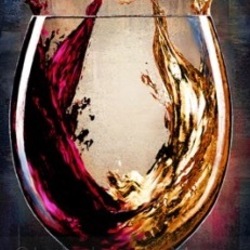Azienda Agricola Marciano
Terra Gratia
Marciano Kosher Estate Red 2013
Tough to find this on Delectable. Hopefully this is the right slot. If not, I'm establishing the wine here.
First, I have a case. So, I will be commenting more later. The deep red color, viscosity apparent in the glass, and the beautiful bouquet of fresh flowers and red fruits, all conspire to create an expectation that is exceeded on the palate. Floral strawberry, hints of vanilla, and soil. Medium plus bodied, medium plus alcohol, medium acidity, soft ripe tannins. Not a single edge or corner-- a perfect sphere in the mouth. It subsides slowly, and you are left to believe you were in Bordeaux. — 3 years ago
Tenuta Acquacalda
Elba Rosso Red Blend 2016
Very nice merlot Sangiovese blend. Full, not much tannin. We had it with seafood in Marciano marina, the town in which it is made. — 7 years ago
Terra Gratia
St. Helena Red Blend 2011
Love the 2011 vintage of this wine. This is the third bottling from Marciano Estate. The winemaker is none other than the venerated Andy Erickson. Bought a half case a few years ago for $35 (regular price is $50) which is a massive discount relative to the other two wines from the estate (as well as the more recent vintages if this same wine, which I️ don’t think are nearly as good). Wish I️ had got more. Requires an hour long decant and then this sleeper opens up gorgeously. Nose is jam-packed full of blueberry cotton candy, berry stems, damp oak, crushed rock, steel and textbook. Palette is dark fruit forward, somewhat creamy and thoroughly enjoyable although less nuanced and complex than the nose. Full mouthfeel. Medium / long finish. Bravo! — 7 years ago
Alfredo Maestro (Bodegas y Viñedos Maestro Tejero)
El Marciano Grenache
Smells like wet leaves (earthy), tastes like tart, cherry candy. — 4 years ago
Fleurs de Prairie
Côtes de Provence Sparkling Rosé Blend 2017
Marciano Estate
Napa Valley Cabernet Sauvignon
Prefer the 12 massiglia. — 8 years ago
Marciano Estate
M Napa Valley Cabernet Sauvignon Blend 2015
Even better 5 years later (see 2020 review). I think this is our last bottle. Sorry we drank the others so early. — a month ago
Cliff Lede Vineyards
Beckstoffer To Kalon Vineyard Cabernet Sauvignon 2015
On the nose; very ruby, floral plum fruits of; blackberries, dark cherries, black raspberries, Thompson raisins, fresh dates and prunes. Black licorice, creamy dark fruit cola, caramel, milk & dark chocolate, soft beautiful dark spice, touch of eucalyptus, fresh herbs, limestone, soft presence dry crushed rocks, a whiff of pepper, fresh lavender, violets and dark withering floral bouquet.
The body is full and lush. Fine meaty, tarry, tannins. Very ruby, floral plum fruits of; blackberries, dark cherries, black raspberries, Thompson raisins, fresh dates and prunes. Black licorice, creamy dark fruit cola, caramel, milk & dark chocolate, soft beautiful dark spice, touch of eucalyptus, fresh herbs, limestone, soft presence dry crushed rocks, suede leather, dry clay, dry top soil, dry underbrush, a whiff of pepper, fresh lavender, violets and dark withering floral bouquet. The acidity is very nice. There is good structure, tension, length and balance that needs 10 years plus to flush out. The finish is good, well balanced with fine powdery sticky tannins.
Photos of, Cliff Lede tasting facility, wire woven sculptures that decorate the grounds, Owner David Lede and the Beckstoffer To Kalon Vineyard.
Producer history and notes...Cliff Lede Vineyards (pronounced LayDee) was founded in 2002 on what used to be S. Anderson Vineyard, a winery that was founded in 1971 by Stanley and Carol Anderson primarily known for their sparkling wines.
Cliff Lede is from Leduc, Alberta a small town just south of Edmonton. The reason you see a Canadian flag in front of the parking next to the US Flag. David and Cliff helped run their father’s construction company he founded in 1947, Leduc Construction. Later the company was renamed to Ledcor Construction in 1982. They ultimately built the business into one of the world’s largest construction companies. Through Cliff, the company established business in the Napa Valley focusing on wineries, restaurants, premium resorts and private residences. Some of their more notable works include; Morimoto Restaurant, Davis Estate Winery, Lokoya Winery, Marciano Estate and the Riverfront Residences in downtown Napa.
After several decades at Ledcor, Cliff decided to pursue his passion for wine. His first introduction to wine was helping his mother make wine at home. Later he began collecting wines from Bordeaux, and even considered purchasing property there. However, he fell in love with Napa after business took him to Northern California.
Cliff Lede owns 60 acres of vineyards in the Stags Leap District. This includes the Twin Peaks Vineyard surrounding the winery and tasting room. The Poetry Vineyard was acquired a year after Cliff established Cliff Lede Vineyards. It is planted on steep hillsides down to the Silverado Trail. It’s planted with red Bordeaux varietals, mostly Cabernet Sauvignon. The soils there are extremely rocky. Despite being so close to the Poetry Vineyard, the soils in the Twin Peaks Vineyard are dramatically different. They are gravelly loam.
From a viticulture aspect, this diversity of terroir is a good representation of what the Stags Leap District has to offer, ranging from its upper most reaches of 400 feet to the valley floor. Even among their two Stags Leap properties, there are micro-climates. The west facing vineyard hillsides become quite warm during the day in the summer but cool off significantly in the evenings. This diurnal temperature swing is important for growing premium grapes including maintaining acidity.
The winery also owns a 20 acre vineyard in Calistoga at the base of Diamond Mountain planted primarily to Cabernet Sauvignon as well as a small block of Sauvignon Blanc.
Further to the north in Mendocino County is their Savoy Vineyard, which is a 42 acre site in Anderson Valley. It is planted mainly to Pinot Noir along with Chardonnay. It provides fruit for their FEL Wines (a name that Cliff chose to pay homage to his mother, using the first three initials of her full name Florence Elsie Lede.
Cliff’s love for all things “Rock and Roll”, he named all their blocks in their Stags Leap District Vineyards after famous rock and roll songs or albums such as “Dark Side of the Moon”, “Walk on the Wildside”, “Light my Fire” and “American Girl. ”Collectively these are referred to as the “Rock Blocks.”
David Abreu quickly realized the exceptional terroir of the Poetry Vineyard as did Cliff when they initially tried some of the S. Anderson wines from this site. Abreu oversaw its replanting and clonal material sourced from a number of premiere Napa vineyards. While Abreu was the original vineyard architect, he is no longer involved in the management of the their vineyards. They are now controlled by their in-house vineyard team.
The winery, tasting room and the nearby luxury Poetry Inn all opened around 2005. Architect Howard Gillam was hired to design the winery. Cliff’s background in construction and architectural preferences certainly influenced its design. The tasting room has a more contemporary feel rather then some of his more rustic looking designs. It features beautiful views of the Napa Valley. Inspired by the shape of tanks during a visit to Château Latour in Bordeaux, Cliff commissioned Missouri based Paul Mueller Company to create special truncated tanks for fermentation to help submerse more of the cap. Each tank corresponds to a specific vineyard block. During harvest, a specially designed crane gently moves and lowers a hopper full of whole berries into each tank.
Sorting is a big part of their attention to detail before fermentation. After the grapes come into the winery, they are sorted by hand, then run through an optical sorter and then finally put through an additional final hand sorting. Nearby is a 20,000 square foot cave that connects directly to the winery. World famous Michel Rolland was brought on in the early years as a consultant. Philipe Melka also made Cliff Lede wines for several years and today Christopher Tynan is the Winemaker. He was formerly Assistant Winemaker at Colgin.
Total annual production is between 18,000 and 20,000 cases depending on what Mother Nature gives them. The majority of this is comprised of their Napa Valley Sauvignon Blanc and their Stags Leap District Cabernet Sauvignon. — 6 years ago











Kath Rt
well balanced (dry-acidity) …subtle “tannins/oaky” notes…. nice wine — 13 days ago